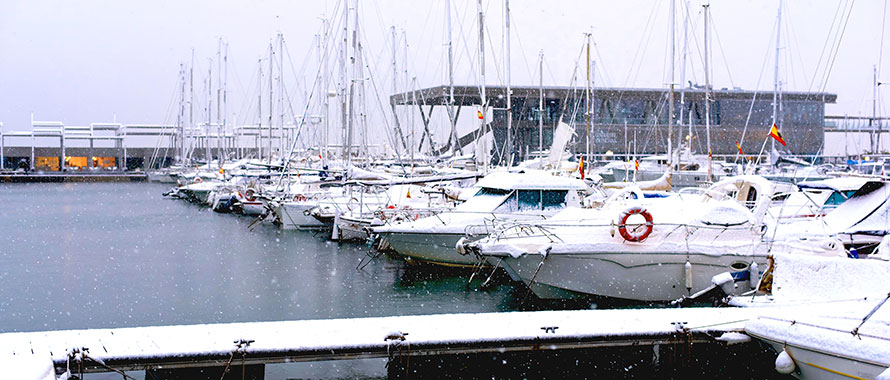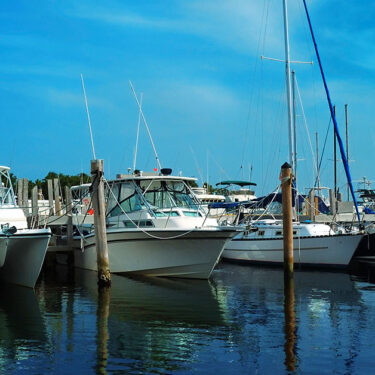Up to 25 boats were damaged when heavy snow caused a roof collapse at a marina in Knox County, Tennessee, on Jan. 15. The head harbor master at the Concord Marina told WBIR Channel 10 News that one of its covered docks “got pancaked on top of the boats,” damaging some of the most expensive vessels held there. The winter disaster was reportedly unlike anything the harbor master had seen in his 19 years at the marina.
While the full extent of the damages were yet to be assessed as of Jan. 16, none of the damaged boats had sunk, according to WVLT News, and no one was injured when the metal roof structure collapsed.
Featured Solutions
Depending on the circumstances of the incident, weather-related damage to boats housed at a marina could be covered by the facility’s Marine General Liability Insurance or an individual boat owner’s Hull & Machinery Insurance. The recent roof collapse in Tennessee is a prime example of why marinas with covered docks can be difficult to insure, said Noah Wheeler, Broker, Marine Burns & Wilcox, Ft. Lauderdale, Florida.
“‘Covered dock’ is almost a bad word in Marine Insurance,” Wheeler said. “They are very tough, especially in places like Tennessee and Oklahoma. The reason for that is the snow pile-up, which is exactly what happened here, and also tornadoes. It can be very expensive because it is a real risk and a real problem.”
Marinas often liable for damage to boats
On the same day as the Concord Marina incident, another similar collapse took place at a marina in Lenoir City, Tennessee, according to the Knoxville News Sentinel. Evacuations were completed before the collapse and no injuries were reported, WATE reported Jan. 16. Photos from the scene showed a thick build-up of snow across the collapsed roof. Last February, a dock roof that was covered in sleet, ice and freezing rain for four days collapsed at a marina in Grand Prairie, Texas, damaging several boats, NBC DFW reported at the time.

Typically, the marina would be liable for boats in their care, custody and control.
Although a marina would typically be liable for damage to boats in these types of incidents, WVLT reported that Concord Marina indicated its leases specify that boat owners would be responsible for paying to repair or replace their vessels. “There are a lot of marinas out there and they all do things differently, and it is possible those slips are privately owned,” Wheeler explained. “Typically, the marina would be liable for boats in their care, custody and control.”
Under a marina’s Marine General Liability Insurance, an extension known as Marina Operators Legal Liability Insurance can generally respond to boat damage and losses due to roof collapse or other incidents such as fire or theft.
“You usually want to insure the marina for the mooring of vessels in the marina, typically based on the receipts of how much money they make off the moorage and storage of the vessels, and cover the marina for that liability,” he said, adding that this coverage would apply unless the damage was caused by an owner; for example, someone starting a fire on a vessel with a cigar.
Marina Operators Legal Liability Insurance would also be designed to cover liability associated with servicing the boat while it is in the marina. “When rated correctly, this policy will include the storage and moorage of individuals’ boats and also allow the marina to work on the boat if they need to clean it, gas it or repair it, and any of the liabilities associated with having the boat on your property in your care, custody and control,” Wheeler said.
Risk of injuries, other hazards at marinas
It is fortunate that no one was injured in either of the recent Tennessee dock roof collapses, Wheeler noted. Due to the risk of injuries, however, it is often recommended that marinas purchase Excess Liability Insurance. This policy can provide liability limits above and beyond what is included in their Marine General Liability Insurance.
“I always recommend Excess Liability Insurance policies,” Wheeler said. “If someone were to have been injured in this situation, then a $1 million limit on the underlying policy just would not be enough. Although it is unfortunate that the boats were damaged, the real concern is if someone would have gotten injured.”
In November of last year, a fire near a marina in South San Francisco, California, sent one individual to the hospital with minor injuries and damaged multiple boats, NBC Bay Area reported Nov. 1. In October of 2023, an explosion on a catamaran at a marina in Goshen, Kentucky, hospitalized one individual with severe burns, WAVE reported.

If someone were to have been injured in this situation, then a $1 million limit on the underlying policy just would not be enough.
When purchasing Marine General Liability Insurance, marina owners may need to provide information about the security of their facility, risk management strategies and contractual requirements for owners who use the marina. Due to the risk of roof collapse caused by severe weather, some marinas may choose to relocate boats from under covered docks.
“It is very important for both individual owners of the vessel and for marinas to have a detailed storm plan and to follow that in case of a storm, whether that be moving the boats out from under the covered docks, moving them out of the water or just having a plan in place in the event of a storm,” Wheeler said, adding that it may also be easier to insure marinas when they are in a secured location that cannot be easily accessed by the public.
Each marina will typically have its own requirements for what types of insurance the boat owner must carry. “Marinas will most of the time have insurance requirements for each individual’s vessel for them to be allowed to be a part of the marina,” he noted.
Forgoing insurance can leave boat owners vulnerable
According to Anderson, higher rates on Marine Insurance have led some individual boat owners to avoid purchasing Hull and Machinery Insurance, instead only carrying the Protection and Indemnity (P&I) Insurance that is usually required and can cover third-party bodily injuries and property damage. Going without Hull and Machinery Insurance, which is designed to respond to physical damage to the boat itself, can put them in a precarious position, however.
“It is a very hard market, and a lot of boat owners are just opting to take the liability coverage that is required by the marina. They may be thinking that if they are not going to use the boat, there is no exposure — but obviously this case proves the opposite of that,” Anderson said, pointing to the recent roof collapses in Tennessee. “It is something that everybody needs to take into consideration. Even if it is parked in a marina, you have the exposure of snow, fire, or another boat hitting your vessel and sinking it.”
Windstorms and tornadoes, for example, are “considered acts of God and not the responsibility of the marina if any damages are caused by that,” Anderson pointed out. “They would have to be covered for that.”
In general, any boats that will be exposed to snow, ice or freezing temperatures should be winterized, he suggested. “You do not want to have a boat in the water when it freezes over. The ice expands and it can end up crushing the hull, depending how cold it is,” he said. “If it is going to be in any type of severe winter weather condition, it is always best to take it out of the water and put it inside of a building or at least on a rack or store it on shore.”
Boat owners should review their marina’s plans and procedures for severe weather and ensure that the facility has the ability to remove the boat from the water if needed. “They will probably incur an additional cost, but the cost for removing it is probably going to be less than the cost to file an insurance claim,” Anderson said. “They should also review their deductibles. Anytime there is a claim, there is always going to be a deductible that is incurred. There are separate deductibles, so just make sure you are aware of what they are, when those would apply, and that financially you can absorb that deductible in the event of a claim.”
Carrying Hull and Machinery Insurance at all times is also important for boat owners because a marina that is responsible for a loss could still be underinsured, leaving the owner with a gap in coverage if their boat is seriously damaged. “If the marina is only carrying $1 million in liability and the roof happens to fall on a $4 million yacht, then it would be underinsured. If the marina does not have enough liability coverage for that, then there would be a gap. In that case, they would be subject to potential lawsuits from the boat owner, or the boat owner may have to go to their insurance to cover it,” Anderson said. “It is always best to have that protection just in case, because the worst case is going to be where the insurance for the marina is either not in place or is inefficient or ineffective and then you have to go against your insurance.”
Boat owners should ask questions when selecting a marina and read contracts carefully, Wheeler added. “You want to know what you are getting into,” he said. “If you are deciding between marinas and one of them is making you sign something to where they are not liable if anything happens to your boat, the one that takes on more responsibility might be the better choice to store your boat.”






